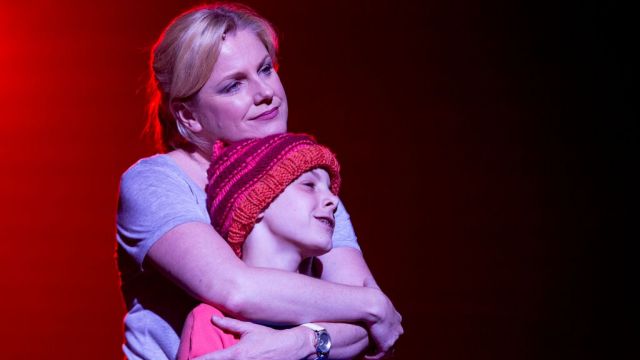Masquerade
Kate Mulvany’s Masquerade has so much going for it: Kit Williams beautiful fantasy children’s classic of the Moon falling in love with the Sun, and Jack Hare sent on a mission to give him the message of love; some wonderful performances; Anna Cordingley’s design (spectacular imaginative costumes); Chris Petridis’ imaginative AV design and great lighting from Geoff Cobham. Why then was I ultimately disappointed?
For me, at least, the marrying of fantasy and reality in Act One doesn’t work. We are tossed from comedy to tragedy, from a crazy hare to a child dying in a hospital bed, with the inclusion of a parallel story of the playwright’s own childhood battle with cancer. Whilst the juxtaposition of poignancy and laughter can work in apposition, Masquerade’s first act tries, somewhat shambolically, to give the stories equal weight and yet remain separate. It isn’t until Act Two that the stories become integrated, and a much cleaner line is followed, as Tessa and her son Joe join the quest for the lost talisman of love. Even then, there is a self-awareness about the whole production; an earnestness to be clever, which makes the piece feel as if it is trying too hard on all counts, and forcing the charm. Here I must disclose that I only recently saw the wonderful The Boy At The Edge Of Everything, which artfully and seamlessly tapped into the inner child in all of us. I loved seeing that production from a subjective child’s perspective. I’m less comfortable objectively seeing this production ask children to view fantasy through adult eyes.

Brilliant performances save Masquerade from tipping into pretension. Helen Dallimore is excellent as Tessa, the mother of a child terminally ill, with nothing but love to offer him. She’s a consummate performer and never fails to be totally credible, even when singing a completely anachronistic blues belter at a time when her son’s life hangs in the balance – surely a wistful ballad would have been more appropriate?
Kate Cheel is always impressive and we have so much to look forward to in the future from her. Her Monroe-esque Moon, and windblown Tara are so different as to seem like two separate actresses. Nathan O’Keefe gives an endearing comic performance as Jack Hare, with great command of the stage and a clear story throughline. Little throwaway bits of business are an absolute delight – while those that have been clearly set by the Directors are more laboured and work less well (the inability to say the word Love…without any variation on the joke…quickly becomes tiresome). Joe is well played by Louis Fontaine/Jack Andrew, but without any real insight into how or why the fantasy makes dying easier (there’s a clear intimation at the end, with Joe in his mother’s arms, that he dies as the day ends). But the real revelation, performance-wise, is the marvellous Zindzi Okenyo, who seems capable of anything and everything. She’s a pragmatic nurse, the avaricious Penny Pockets (in a stunning costume) a marvellously lithe and sensual Dawn, and an appropriate bubble filled fish. But it’s as a Fat Pig that she almost brings the show to a standstill with her wonderful crazy dancing, genuinely funny and natural. By far the most endearing performance of the night.
Mikelangelo is a musician, not an actor, and unfortunately it shows. As the sun he is suitably aloof and above us, but without any sense of vulnerability – after all, the sun believes he is ugly and thus unloved, and surely that calls for him to be at least intrigued that the moon has fallen in love with him? It’s a one dimensional performance. Pip Branson fares better as The Man Who Makes The World Go Round, and Isaac Newton.
 The much talked about original music by Mikelangelo and the Black Sea Gentlemen was the most problematic area for me. I adore gypsy music but, in the context of theatre, I would hope for it to continue…and preferably advance….story and character. It doesn’t. In most cases the songs are either disconnected from action completely, or comment on what we have already seen. They’re well executed but not memorable, and lyrics (rather than being deliberately child-friendly), are often banal and trite.
The much talked about original music by Mikelangelo and the Black Sea Gentlemen was the most problematic area for me. I adore gypsy music but, in the context of theatre, I would hope for it to continue…and preferably advance….story and character. It doesn’t. In most cases the songs are either disconnected from action completely, or comment on what we have already seen. They’re well executed but not memorable, and lyrics (rather than being deliberately child-friendly), are often banal and trite.
Add to this the somewhat cheesy humour, including fart jokes, which is super-imposed and plays down to children rather than coming naturally from the action, and you (hopefully) see the contributory factors to my disappointment. It wasn’t helped by poor sound which meant some of the dialogue was unintelligible.
There is much to admire, rather than love, about this production and it is certainly worth seeing. But it offers style over substance and stops short of creating jaw-dropping, imagination-taking-flight, magic for young and old.
Coral Drouyn
Subscribe to our E-Newsletter, buy our latest print edition or find a Performing Arts book at Book Nook.

